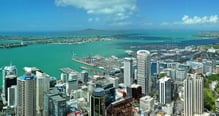 Sky-rocketing Auckland house prices are showing signs of slowing down and any talk about hitting a $1 million average is "over inflating" where prices are heading.
Sky-rocketing Auckland house prices are showing signs of slowing down and any talk about hitting a $1 million average is "over inflating" where prices are heading.Barfoot & Thompson figures show the average sale price reached $906,560 in August, up 4.5 per cent compared to July.
However, this was an increase of only 2.6 per cent on the average price over the previous three months.
Auckland's largest real estate agent believes the rate of growth in house prices is showing signs of easing back. Barfoot's managing director, Peter Thompson, says the current price increases are relatively modest, compared with previous years.
Barfoot & Thompson managing director Peter Thompson said August's price increase was "restrained".
READ MORE: Reserve Bank property investor lending restrictions explained
"Our data shows that those claiming the average price is on the verge of topping $1m are over inflating where prices are heading."
Data from QV, due to be released on Tuesday, is expected to show the average Auckland house price has reached $1m.
Thompson said for the past five months, buyers have not been prepared to pay more than what they think is the market price.
Sales numbers were also down 9.2 per cent in August when compared with the previous three months.
"The continued rise in prices with lower sales indicates that new regulations requiring investors to have greater equity than previously, which the trading banks enforced at the start of August, has had a limited impact on prices but may have affected sales numbers," Thompson said.
New Reserve Bank rules limit how much investors can borrow and re-tighten limits on how much banks can lend to people with house deposits under 20 per cent.
This includes a restriction on how much bank lending can go to residential property investors with a loan-to-value ratio of more than 60 per cent - that is, those who have a deposit of less than 40 per cent.
The new rules are not meant to come into effect until later this year, but banks started applying them within days.
Despite an initial surge in people wanting to get loan approvals, Corelogic senior research analyst Nick Goodall said there was a 5 per cent drop in August, when compared with June.
He said this was a good indication of where the market was heading, but doubted whether it would have much effect on investors because a quarter of sales to investors did not require a mortgage and many would come under the 60 per cent loan-to-value ratio (LVR) .
"It's not going to completely hammer the investor market ... but we're certainly expecting to see a slowdown in some ways but only for a short term."
Valocity valuations manager James Wilson said it was too early to tell what the exact implications are going to be with the latest loan restrictions, but actions like this tended to have a greater short-term impact on activity levels.
"'Historically, activity levels have surged immediately post the announcement of any LVR strengthening up until the date of implementation from which point activity levels stall until market participants determine what effect the changes will have on values."
Bayleys Real Estate managing director Mike Bayley said his firm had yet to see any effect of the new LVR rules on pricing levels or potential buyer numbers.
Particularly in the middle and higher end, buyers with more equity in existing homes were not "shackled" by the new lending restrictions as those who were more entry-level, he said.
"We are forecasting a surge in buyer activity across most regions as we head into the traditional high activity spring quarter."
Bayley said home-owners wanting to sell before Christmas looked set to benefit from the continue lack of supply.
Several regional house prices hit all-time highs for August according to Realestate.co.nz figures and the average asking price for residential properties in Auckland hit $907,986.
QV's July figures showed house prices in Auckland hit an average of $975,000.
.png)




.png?width=200&height=100&name=RE%20Investar-Logo-MRI_Colour%20web%20229x115px%20(1).png)